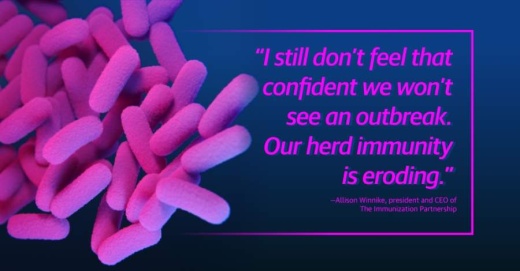According to data provided to Community Impact Newspaper, Austin Regional Clinic experienced a 22% drop in administered pediatric vaccines in March and April as compared to March and April of last year. Pediatric wellness checks also declined by 38% in that same time.
“Nationally, we have seen that the number of children receiving vaccines has dropped, and we’ve also seen that within our own clinics. ... We have used extraordinary efforts to keep our rates up,” said Dr. Elizabeth Knapp, co-chief of pediatrics at Austin Regional Clinic.
As children miss scheduled vaccinations for potentially fatal diseases, such as measles and pertussis, health care officials are concerned Austin is growing increasingly vulnerable to outbreaks of vaccine-preventable diseases.
Central Texas’ vaccine exemption rates already sit above the state average, and experts warn that the additional drop in vaccine coverage caused by the coronavirus pandemic may push the Austin community past the ability to protect infants and the immunocompromised with herd immunity.
“Austin is in bad shape,” said Allison Winnike, president and CEO of the Immunization Partnership, a Texas-based nonprofit that aims to eradicate vaccine-preventable diseases. “I still don’t feel that confident we won’t see an outbreak. ... Our herd immunity is eroding.”
SLIPPING COVERAGE
On March 24, the U.S. Centers for Disease Control and Prevention issued guidance for parents and health care providers to continue routine pediatric wellness care and immunization, especially for children younger than 24 months old. This guidance came 11 days after President Donald Trump declared a national state of emergency in response to the coronavirus pandemic.
Despite its guidance, the CDC reported May 15 that the number of vaccines administered nationwide has plummeted as cities and counties declare stay-in-place orders.
“The identified declines in routine pediatric vaccine ordering and doses administered might indicate that U.S. children and their communities face increased risks for outbreaks of vaccine-preventable diseases,” the May 15 CDC report reads.
The CDC states in its report that parents may be staying away from pediatric clinics out of concern over exposing their families to the coronavirus.
Kayla Jordan, a North Austin mother with a 15 month-old son, said the concern of contracting COVID-19 weighed on her mind as she took her son in recently for his tetanus, diphtheria and pertussis, or DTAP, vaccine.
“If I can reduce the risk of his exposure to coronavirus by not going to the doctor's office, then of course, I will,” Jordan said. “If he didn’t need that vaccination, then I wouldn’t have taken him in.”
Jordan took her son to Austin Diagnostic Clinic for his routine check up and vaccination. The clinic, Jordan said, went to great lengths to sanitize everything, from pens and clipboards to commonly touched surfaces, such as waiting room counters.
At ARC, Knapp said the pediatric offices are offering Saturday wellness check appointments where doctors only see patients who have no symptoms of COVID-19. These Saturday clinics have been very well-attended, Knapp said, leading her to believe that families just do not want to risk visiting an area that has been potentially infected.
“We think quite a bit of it is [that] people don’t want to be in a medical facility where people could have been sick,” Knapp said.
For thousands of families in and around Austin, however, the ability to get their children vaccinated may have simply been taken away.
As confirmed cases of coronavirus have grown throughout Central Texas, Winnike said many health care providers may have been forced to pull doctors and nurses from vaccination clinics and relocate them to work on the coronavirus response. Other locations may not have the protective personal equipment necessary to maintain a safe clinical site.
“We have people shut out of access,” Winnike said.
Two immunization clinics operated by the city of Austin have shuttered since March 17 due to modifications in operation and staffing as part of the city’s response to the coronavirus pandemic, according to the city’s website.
These two clinics—the Far South Austin clinic at 405 W. Stassney Lane and the North Austin St. John clinic at 7500 Blessing Ave.—provided thousands of pediatric vaccinations to residents on a monthly basis through the Shots for Tots program.
According to city of Austin data, the two clinics administered 2,478 vaccines per month, on average, through the Shots for Tots program in 2019.
In August 2019 alone, the North Austin St. John clinic administered 2,926 shots.
Central Austin resident Shelby Strong said she relies on these clinics to vaccine her 13 month-old son. Strong’s family is part of a health sharing ministry and uses a pediatric office for routine wellness checks, but the Shots for Tots program allows her to access affordable vaccinations.
The Shots for Tots program charges $10 per dose of vaccine for children, though the city’s website said its clinics will not turn away any patients who cannot pay for the vaccinations.
Strong said her son’s vaccination schedule currently calls for four or five vaccinations at his next check-up. When Strong asked their pediatrician what the cost of those vaccinations would add up to, they found the bill would be up to $500.
Due to the Far South Austin and North Austin St. John clinics’ current closures, Strong has been unable to get her son’s 12-month vaccination doses.
“When things really start to open up, I would hope that the city opens up the clinic that allows people to get vaccines. ... It doesn’t seem like a thing that should have been shut, ever,” Strong said.
To compound the issue, Strong said she believes the demand at the clinics when they reopen will make it very difficult to schedule an opportunity to get those vaccinations for her son.
“I do foresee there being a major issue with availability when they do open up. ... There are going to be a lot of kids who need vaccines,” Strong said.
If jobs lost during the coronavirus pandemic become prolonged windows of unemployment, the need for nonprofit vaccination clinics will continue to rise as well. For many Texans, as they lose their jobs, so too goes their health insurance.
“Unfortunately, many of us are dependent on having a job to have insurance coverage,” Knapp said. “Of course, there will be fewer people who can protect their children against vaccine-preventable illnesses.” OUTBREAK AFTER SHUTDOWN
Austin has historically been an area with vaccination exemption rates above the state average across Texas.
On April 30, the Texas Education Agency released data showing rates of nonmedical, or conscientious, exemption rates for vaccines in school districts and counties across Texas for the 2019-20 school year.
For the second year in a row, the rate of conscientious exemptions in Travis County has declined, but the county still sits above the state average. In the 2019-20 school year, Travis County collective reported an exemption rate of 2.31% of all students, compared to Texas’ statewide rate of 1.35%.
In neighboring Hays and Williamson counties, the gap in coverage rates is more pronounced.
Hays County reported a collective 2.51% of students with a conscientious exemption to at least one vaccine, while Williamson County reported 3.18% of its student body had a nonmedical exemption. As these rates creep up, health care officials said the Austin community may begin to lose the effectiveness of herd immunity, where nonvaccinated infants and those with compromised immune systems are indirectly protected by a very high rate of the population maintaining vaccinations in order to prevent outbreak.
“If our rates of vaccinations continue to drop, then we’re going to leave our infants at risk,” Knapp said.
Now, after thousands of local children may have missed important vaccination doses to protect against measles, mumps, rubella, pertussis and more, they may begin interacting with the general public more as sections of the Texas economy gradually reopen.
These conditions have health care leaders concerned over the potential of an outbreak of vaccine preventable diseases.
“Even though we’re not really traveling as much internationally as we were precoronavirus, there are still a lot of opportunities for infectious disease to get introduced into the community,” Winnike said. “We had a lot of coronavirus cases get introduced to Texas through New York. ... The same thing happens with measles. You only need one person to get in from somewhere.”
The concern is not unprecedented. Earlier this year, the city of Austin reported its first cases of measles and rubella in two decades within a one-month window.
Both of those diseases are preventable by the mumps, measles and rubella (MMR) vaccine, which is required for Texas children enrolling in school.
Measles is a highly contagious disease that can be fatal, according to the CDC. Knapp previously told Community Impact Newspaper that measles can lead to long-term health complications, including fatal brain infections later in life.
According to the CDC, pregnant women who contract rubella are at risk of miscarriage, and their developing fetuses are at risk of developing birth defects with lifelong consequences.
“We do still know people are traveling on planes. ... If vaccine rates drop in our community, then measles is just one plane ride away,” Knapp said. CONTINUING CARE
Knapp urges parents with concerns over clinic safety to reach out to their pediatricians and talk to them about safe ways to access wellness care and vaccinations.
ARC clinics, Knapp said, are frequently sanitized, and staffers go to extreme measures to limit contact with patients showing symptoms of COVID-19. According to Knapp, staff at ARC have a lower rate of COVID-19 infection than the larger Austin community.
While she held reservations about going into a pediatrician’s office for care, Jordan said she felt “very safe” in the clinical setting once she arrived.
“I follow the doctor’s recommendations, and I would rather be safe than sorry,” Jordan told Community Impact Newspaper. “If anybody has concerns, they should call their doctor office. Just talking to them made me feel better about it.”
Winnike is urging parents to resume routine wellness checks and immunizations not just to protect their children but the rest of the population as the coronavirus pandemic rages on.
Any outbreak of vaccine preventable diseases, Winnkie argues, will contribute unnecessarily to the caseload of an already stressed health care system.
“Now, more than ever, if there is something we can do to prevent getting sick [or] hospitalized, ... we need to do it because we want to make sure we’re healthy and not causing an additional burden,” Winnike said.





